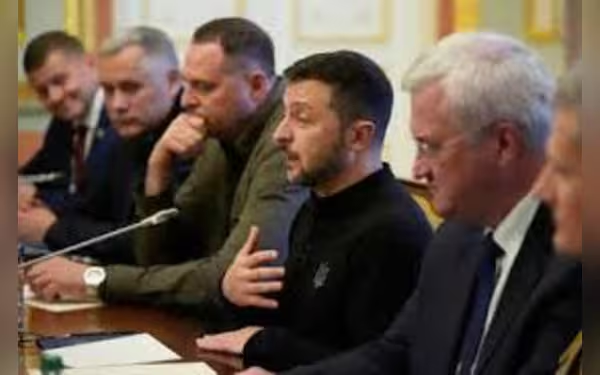Saturday, November 16, 2024 07:56 PM
Russia's Threats to Ukraine and the West Amid Long-Range Strikes Decision
- Russia warns of severe escalation if Ukraine strikes back.
- Zelenskyy emphasizes reliance on Western military aid.
- Medvedev hints at potential nuclear responses to Western actions.
 Image Credits: thefrontierpost
Image Credits: thefrontierpostTensions rise as Russia threatens Ukraine and the West over long-range strikes, with potential nuclear responses looming.
In recent developments, tensions between Russia and Ukraine have escalated significantly, with Russian officials issuing stern warnings to both Ukraine and Western nations. The backdrop of this situation is the ongoing conflict that has seen Ukraine striving for support from its NATO allies, particularly in the form of long-range weaponry. This support is crucial for Ukraine as it seeks to defend itself against Russian aggression and to potentially strike back at military targets deep within Russian territory.
Ukrainian President Volodymyr Zelenskyy has made it clear that his strategy for achieving victory hinges on the decisions made by Washington regarding military aid. This statement underscores the importance of international support in Ukraine's fight against Russia. Andriy Yermak, who heads Zelenskyy’s office, emphasized the need for decisive action, stating, "Strong decisions are needed. Terror can be stopped by destroying the military facilities where it originates." This highlights Ukraine's belief that offensive capabilities are essential to curtailing Russian attacks.
Despite Ukraine's urgent requests, Western allies have been hesitant to grant permission for such strikes. Concerns have been raised that allowing Ukraine to target Russian territory could provoke a severe escalation in the conflict. Russian Deputy Foreign Minister Sergei Ryabkov has claimed that a decision has already been made regarding Ukraine's military capabilities, suggesting that Moscow is prepared to respond aggressively to any perceived threats. He stated, "The decision has been made, the carte blanche and all indulgences have been given (to Kyiv), so we are ready for everything." This rhetoric indicates a readiness for heightened military action from Russia.
Former Russian President Dmitry Medvedev has also weighed in, warning that the West is testing Russia's limits. He pointed to Ukraine's recent operations in Russia's Kursk region as justification for potential nuclear responses. Medvedev ominously stated that Russia could resort to its nuclear arsenal or employ other deadly weapons, suggesting that the stakes are incredibly high. He ominously remarked, "And that would be it. A giant, grey, melted spot instead of ‘the mother of Russian cities’,” referring to Kyiv.
In response to these threats, Yermak has asserted that the loud proclamations from Putin's regime are merely a reflection of their fear that the cycle of terror may soon come to an end. This exchange of threats and counter-threats illustrates the precarious nature of the current situation, where both sides are on high alert and prepared for any eventuality.
As the world watches these developments unfold, it is clear that the conflict between Russia and Ukraine is far from over. The potential for escalation remains a significant concern, not just for the countries involved, but for global stability as well. The decisions made in the coming days and weeks will be crucial in determining the future of this conflict and the safety of millions. It is a stark reminder of the delicate balance of power in international relations and the profound impact that military decisions can have on the lives of ordinary people.













